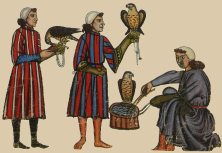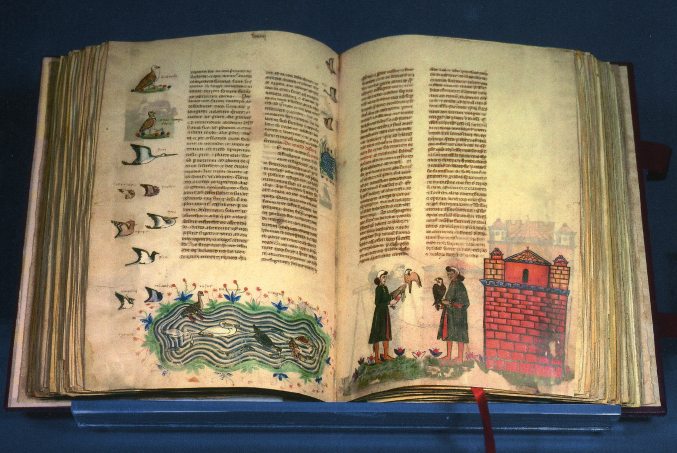|
| The Art of Falconry Frederic II von Hohenstaufen (Arte venandi cum avibus) |  |
|
|
| A
magnificient book on falconry—the first major work in European history—written in 2nd half of 13th century | Biblioteca Apost.
Vaticana ms. pal. lat. 1071 deluxe facsimile edition |
|
|
|  |
|
| The
art of falconry, one of the oldest sports, consists in the use of birds
of prey trained to hunt birds of a larger size like cranes, bustards,
geese, and other species they wouldn't normally hunt. These hunting
techniques arrived in Europe
around the 5th century and were introduced by the Germanic invaders.
The mosaics of the Halconero Villa in Argos, Greece, showed for the
first time what this art is. After its introduction in Europe falconry
rapidly spread there, becoming the favorite sport of kings and
princes. During the Renaissance when firearms were perfected,
falconry declined and almost disappeared. Falconry gave rise to a very abundant literature; the first work in Europe is a 10th c.tract by the "Anonymous de Vercelli". Frederick II von Hohenstaufen, a passionate hunter and especially interested in falconry and the natural sciences spent more than 30 years gathering information and experiences to write the master work of the Western art of falconry: De Arte Venandi cum avibus (The Art of Falconry). | | This
erudite emperor considered all previous literature in
this area poor and insufficient. Frederick's
work is transmitted in Codex ms. pal. lat. 1071, preserved in
the Biblioteca Apostolica Vaticana. This 2-column 111 folio parchment
manuscript is the most famous and best known of all the works of
Frederick II because of its incredibly beautiful illustrations. The
marginalia has 170 human figures, more than 900 species of birds, 12
horses and 36 other animals plus all the paraphenalia needed for
falconry. The facsimile: Full color reproduction in the original format (25 x 36), 220 pp, with scholarly commentary by José Manuel Fradejas Rueda, a specialist in medieval and renaissance falconry literature. Published by Testimonio, in Madrid, 2005. Price (until further notice): Eu 2,500. (Please call for special OMI price.) |
|
 |
OMI - Old Manuscripts & Incunabula PO Box 6019 FDR Station, New York NY 10150
tel/fax 212/ 758-1946 - http://www.omifacsimiles.com - immels@earthlink.net